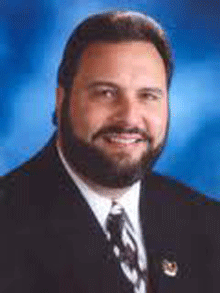Trial of former county commissioner prompts corruption questions

Government corruption disclosures have been the main attraction at the trial of former Cuyahoga County, Ohio, commissioner Jimmy Dimora.
During the second day of testimony in Dimora’s racketeering trial, federal prosecutors devoted much of their attention to a Las Vegas junket that included Dimora, then-County Auditor Frank Russo and seven of their friends.
Trial testimony detailed some of the trip expenditures, including thousands of dollars of gambling chips, a $2,000 dinner, prostitutes, limousines, more than $6,000 for hotel rooms and charges, and first-class airplane tickets.
An FBI agent testified that a Berea, Ohio, construction contractor, hoping to land $45 million in county contracts, paid for the Vegas adventure.
Many of more than 20 wiretapped calls played in the courtroom dealt with planning for the trip. Surveillance video projected on high-definition screens in the courtroom depicted Dimora, the contractor and their friends playing high-stakes blackjack, with the contractor providing Dimora’s gambling chips.
The charges against Dimora are found in a 36-count, 148-page federal indictment that alleges that he used his county commissioner’s office as the base to run a criminal enterprise. The indictment relies on the federal RICO law, which has become an important tool in attempts by federal prosecutors to remove corruption in local government.
The FBI’s extensive use of surveillance tools in Dimora’s trial may convince some that it is more difficult for government officials to engage in corruption in 2012, with increased media scrutiny, more federal oversight, 24/7 social media/web documentation and electronic surveillance.
One person who does not think government corruption has diminished is J. Bruce Maffeo, a veteran white-collar criminal defense attorney and former federal prosecutor. “I think as a general observation, both as a former federal prosecutor and criminal defense lawyer, that greed is a basic part of human nature and not likely to go significantly down.”
High-tech surveillance will not keep government officials from accepting bribes, Maffeo told Govpro. “Most people who engage in criminal activity are operating on the assumption that they aren’t going to get caught. The arsenal of weapons that are available to the government, such as consensual recordings and wiretaps, have been around for decades, and it doesn’t seem to have diminished the level of criminal behavior,” he said.
Maffeo now heads the White Collar Criminal Defense Practice for the New York law firm of Cozen O’Connor. He has more than 30 years of experience practicing criminal law, starting out as a federal and state prosecutor before entering private practice in 1989.
Follow the money, says Mary Boyle, director of communications at Washington-based Common Cause. “The inordinate amount of money that we are seeing in politics certainly lends itself to a climate in which corruption is more likely to happen,” she says.
A change is needed in the way we pay for political campaigns, Boyle told Govpro. “From a Common Cause perspective, we think that we need a system of publicly funded, or clean, elections so that for people in government, their main concern isn’t what do their biggest contributors want, it’s what’s best for their constituents. Right now we have a government that is, at all levels, dependent and reliant on their major campaign contributors, and we see many instances where those people are put ahead of what’s good for the public good.”
Common Cause is a nonpartisan, nonprofit advocacy organization that serves as a vehicle for citizens to make their voices heard in the political process and to hold their elected leaders accountable to the public interest.
The trial of Jimmy Dimora, which is taking place in U.S. District Court in Akron, Ohio, has begun its final phase. The defense rested its case last week.




















